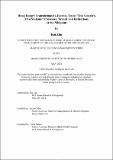Hong Kong's Transformative Journey Under 'One Country, Two Systems': Processes, Trends and Reflections at the Midpoint
Author(s)
Zhu, Rui
DownloadThesis PDF (1.685Mb)
Advisor
Cohen, Jacob
Terms of use
Metadata
Show full item recordAbstract
Since the 1997 handover, Hong Kong has reached the midpoint of its unprecedented constitutional experiment under the 'One Country, Two Systems' principle. In the twenty-six years since Hong Kong's return to China, the region has achieved remarkable success within this unique political framework. From the 1960s through today, Hong Kong has transformed into one of the wealthiest, most economically developed regions with the highest living standards worldwide. As Asia's financial center and a global hub for business, shipping, and trade, Hong Kong has made significant contributions to Asia's development and progress. However, despite its rise as a global financial powerhouse, Hong Kong faces numerous challenges. These include limited industrial diversification, a lack of technological innovation, the gradual erosion of civil liberties, and diminishing geopolitical neutrality amidst the escalating U.S.-China rivalry. The complex interplay of these factors poses significant risks to Hong Kong's long-term prosperity and stability.
This thesis chronicles Hong Kong's transformative journey since 1997, examining key development trends and its current predicaments. It aims to capture the insights and lessons learned, providing a basis for thoughtful consideration of how to enhance Hong Kong's unique strengths and characteristics, address its vulnerabilities, and thereby launch a new phase in its developmental journey.
Date issued
2024-05Department
Sloan School of ManagementPublisher
Massachusetts Institute of Technology